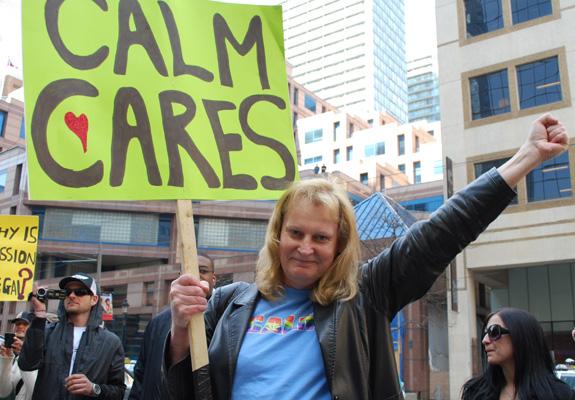Police officers barge through the doors, pushing and shoving as they enter. One man is knocked to the ground, and another is hit on the head. Before long, many are arrested. The victims of this raid are forced to lie face down on the floor, where they are handcuffed and humiliated.
Sexual minorities have faced their fair share of discrimination and violence in the past by the Toronto Police Service. The scars of such memories are often long lasting and painful. The March 31 raid on Cannibis as Living Medicine (CALM) – a cannabis club in downtown Toronto that helps people with serious medical issues deal with the pain and suffering they face, brought some of those memories back into the light.
On the otherwise unremarkable afternoon, totally without warning, officers from 51 Division rushed into the building, traumatizing staff, volunteers, and, most seriously of all, vulnerable people who, in psychological terms, certainly should not have to face more suffering than is already their portion.
According to Constable Tony Vella from 51 Division “the raid was precipitated by community complaints which raised further questions about whether CALM had an appropriate licence to dispense.”
They are taking marijuana to alleviate their suffering, nothing more, nothing less. Many are HIV positive gay men. In addition, a large number of the members, both gay and straight, live on disability payments that everybody knows are woefully inadequate.
Sandra Petite, a trans woman who works at CALM, was arrested in the raid along with eight others. She says the experience was a personal violation.
Originally from Kitchener, Sandra came to Toronto in 1995 while transitioning, a process that reaffirmed her identity as a woman. She went through many changes, as well as transitioning, she was diagnosed with fibromyalgia and chronic fatigue syndrome. She was prescribed a number of medications that ended up doing her more harm than good. Finding herself in a dark and uncertain place, being in a new city and dealing with illness, she had her doctor refer her to CALM.
Shortly after she began using marijuana, her health, and her spirits, improved significantly. Before long Sandra was asked to be a volunteer staff member at CALM, where she has worked for the past six years. Not only did the cannabis club give her a sense of validation and confidence as a transgendered person, she says, but it also brought her a new family and true friendship.
“Here, we truly love one another,” she says.
“Even though the raid happened, our dispute is not with 51 Division,” she says. “We believe it is the lack of clarity around Health Canada’s policies that precipitated the situation that Wednesday afternoon.”
Although one can get a licence to access medical marijuana in Canada, there are still grey areas surrounding who can distribute it and how the distribution system works. The federal government does have a program in place through which one can obtain marijuana directly from Health Canada. However, that process is lengthy and impractical for the average user because of the red tape involved. Furthermore, only one strain of marijuana is available through government sources, and different strains offer different benefits.
In the larger picture, the law forces people who require marijuana for medical purposes to live on the fringe of what is legal and what is not. Sandra, who does intake for all prospective members of CALM, says there is often hesitation and fear when people come in for the first time. Nevertheless, she says, the professional atmosphere and the warmth with which people are treated quickly dispel any nervousness they may have.
But since the raid, many CALM members have been cut off from their medicine.
“The calls and emails keep coming in as people don’t know what to do, and I feel my hands are tied and my heartstrings are being pulled,” says Sandra.
“I’m very concerned about members’ well being and I know that a lot of them are not doing so well,” says Neev Tapiero, CALM’s owner. “Many have ATP Health Canada licences and yet they are unable to exercise their rights to access high quality cannabis.”
“Our doors are open for clients to come and talk to us and we are encouraging them to do so,” says Tapiero. “I believe that keeping the lines of communication open during this difficult time is crucial. There is up-to-date information on the CALM website and we are hoping to have more information for members very soon in regards to re-opening.”
According to the Canadian AIDS Society, between 14 and 37 percent of people living with HIV/AIDS use medicinal marijuana. The AIDS Committee of Toronto (ACT), has supported the decriminalization of marijuana for medical purposes since 1997.
“The abrupt closing of a compassion club could affect clients who rely on marijuana to deal with side effects of HIV medication,” says John Maxwell, director of policy and communications at ACT. “In a worst case scenario, it could result in people not taking their medication, which has negative effects on their personal health and the risk of transmission.”

 Why you can trust Xtra
Why you can trust Xtra


